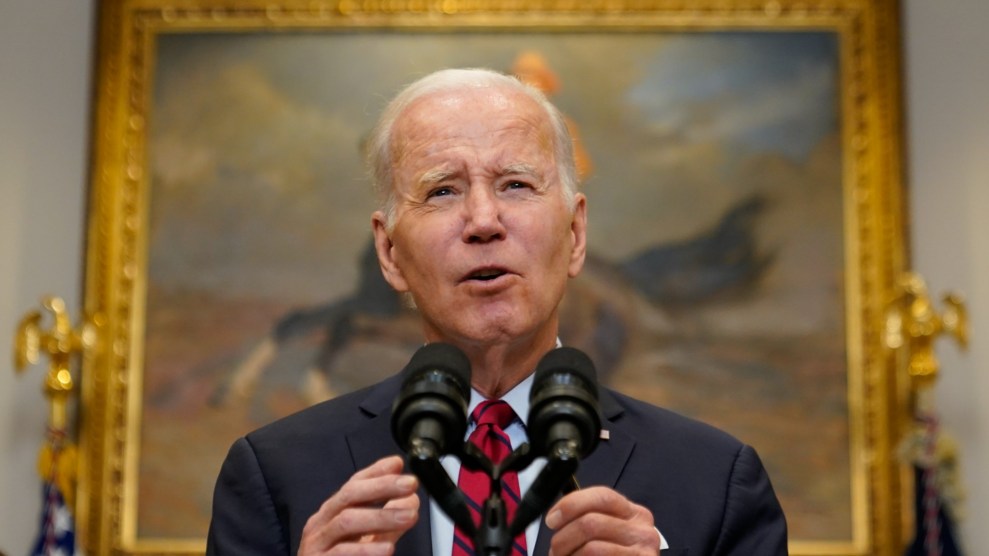
A couple from Cuba wait to be processed to seek asylum after crossing the border into the United States.Gregory Bull/AP
After weeks of anticipation, the Biden administration has finally followed through with the plan to revive a policy first proposed during the Trump administration. It would make migrants ineligible for asylum in the United States if they don’t first seek protection in countries they passed through on their way. The proposal for the so-called transit ban had previously prompted fierce condemnation from immigrant rights groups, who have already vowed to challenge this new version in court. “If the proposed asylum ban rule does what we expect it to do—unlawfully deprive access to asylum based on the manner of entry and/or transit route,” Keren Zwick, director of litigation at the National Immigrant Justice Center, told NBC News, “it would be invalid like the similar Trump administration rules that were found unlawful by federal courts.”
The policy, which is set to take effect after a 30-day public comment period, comes as the Biden administration prepares for the projected termination in May of another Trump-era border policy known as Title 42 that relies on a public health order to promptly turn away most migrants. Under the newly released transit ban, migrants who don’t meet the requirement will be deported with few exceptions—such as for medical emergencies and “an imminent and extreme threat to life or safety.”
The policy, first championed by anti-immigration hardliner and President Donald Trump’s senior adviser Stephen Miller, was repeatedly blocked by federal courts between 2019 and 2021 for being unlawful. “When Congress established the right to asylum, it did so without such requirements on where people may have previously traveled through or other pathways available,” a group of US lawmakers wrote to the president in a January letter. “It is, in fact, necessary that asylum must be maintained and strengthened to ensure that safety is within reach, particularly for the most vulnerable.”
The Biden administration is resurrecting a Trump-era asylum ban that will send people back to persecution. It's an incredible flip-flop from a candidate who campaigned *and won* the election with promises to allow asylum. https://t.co/fLOllKb4yp pic.twitter.com/aMz3HFrx8g
— David Bier (@David_J_Bier) February 21, 2023
“Today, rather than make progress on addressing regional mass migration, the Biden Administration has resurrected a transit ban that normalizes the white-nationalist belief that asylum seekers from certain countries are less deserving of humanitarian protections,” Andrea Flores, who formerly served as director for border management on Biden’s National Security Council, wrote on Twitter. “For an Administration that strives to uphold racial equity, it is deeply disheartening to watch them normalize the dehumanizing narrative that Black and brown migrants at the southern border deserve to be punished for seeking out a legal pathway that Congress provided for them.”
Meanwhile, the Department of Homeland Security Secretary Alejandro Mayorkas has disputed claims that the policy resembles the one from the Trump era by arguing the Biden administration has concomitantly implemented a parole process allowing 30,000 migrants from Venezuela, Haiti, Cuba, and Nicaragua to apply for temporary stays in the country every month. “We have built lawful pathways,” he told reporters. “We do have a way for asylum seekers to seek relief at the ports of entry.” Texas and 19 other states are currently suing the government over this parole program.
But immigrant rights groups say the policy will have the same effect as Trump’s transit ban, forcing asylum seekers with legitimate claims to return to danger. Several experts have noted that the countries most migrants cross before reaching the Southern border are neither safe nor equipped with robust asylum processing systems. “While we welcome the limited, temporary legal pathways for some nationals from Cuba, Haiti, Nicaragua, and Venezuela,” reads a letter signed by 292 civil, human rights, and immigrant rights groups, “such pathways are neither asylum nor a substitute for asylum, and they do not excuse the legal damage and human suffering that has and will be inflicted by asylum bans or other policies that seek to impose harmful consequences on people seeking this country’s protection.”
Krish O’Mara Vignarajah, president and CEO of Lutheran Immigration and Refugee Service said in a statement that “this rule reaches into the dustbin of history to resurrect one of the most harmful and illegal anti-asylum policies of the Trump administration” and goes against decades of US law precedents and international agreements. “Requiring persecuted people to first seek protection in countries with no functioning asylum systems themselves is a ludicrous and life-threatening proposal,” she wrote.













